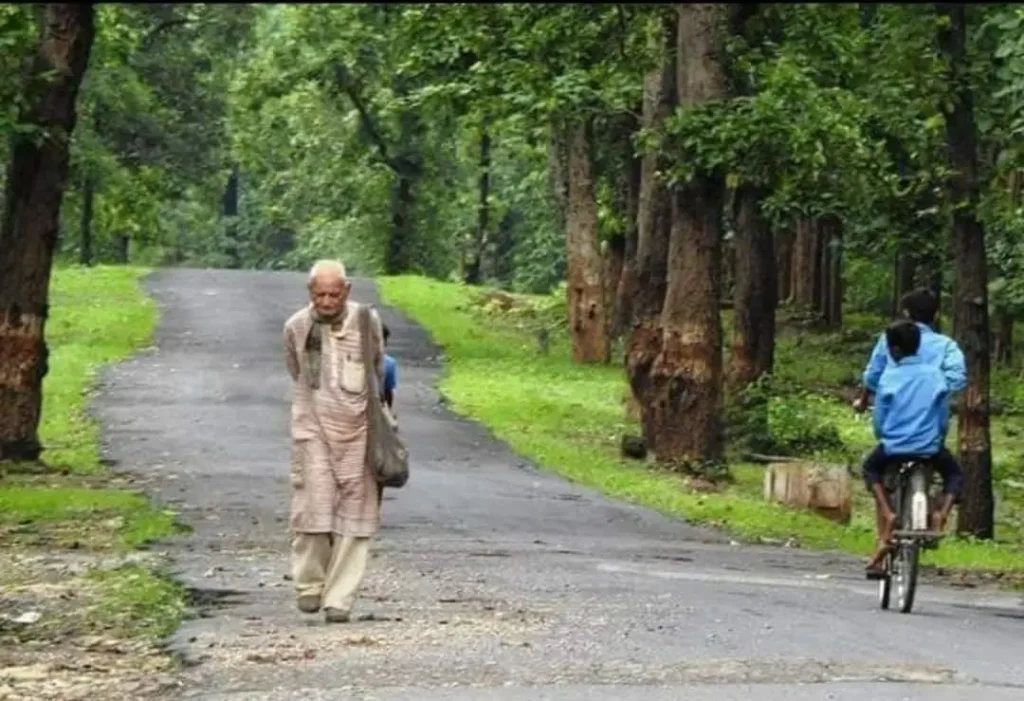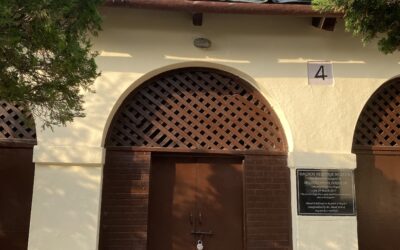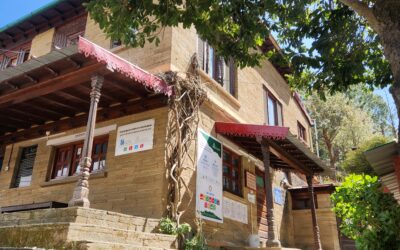“The best way to find yourself is to lose yourself in the service of others.”
Mahatma Gandhi
In the realm of helping others and positively impacting society, there’s a remarkable person named Professor P. D. Khera. Prof. Khera devoted his life to tribal education. Because of his work with the tribal community in Lamani he has been called the “Modern Gandhi” or “Lamani’s Gandhi”.

Prof. Khera’s Life
His visits to Chhattisgarh led him to settle in Lamani, a Baiga-dominated village within the Achanakmar Tiger Reserve area. There, he built a hut and started teaching local children. Despite facing challenges, including suspicions of being a Maoist, the State Forest Department recognised his commitment to teaching and invited him to establish a school.
Professor P. D. Khera taught Sociology in Hindu College (University of Delhi). He retired in April 1993. During his tenure, he explored various research topics, ranging from the ‘sociology of love’ to the life of Maharaja Ranjit Singh. After retiring, he started visiting tribal villages in Chhattisgarh regularly. Initially moving between different research topics, he eventually focused on studying the Baigas, a vulnerable tribal group.
This article on Prof. Khera highlights a life that goes beyond academics, showcasing a person dedicated to uplifting tribal communities through education.
People affectionately called him ‘Dilli wale baba’ (‘the seer from Delhi’). His presence became a source of inspiration, and he was honoured with awards including the ‘Mahatma Gandhi Swaranjali Award,’ ‘Dharohar Samman,’ and the ‘Chhattisgarh Gaurav Award’ for his exceptional work.
P. D. Khera and the Baiga Community
Professor Prabhudatt Khera was a friend of Professor Marwah in Delhi. I spoke to Prof. Marwah briefly. He shared that once when Khera visited Delhi, his associate took him to Kheda Khurd village. Khera liked the village a lot. So the associate suggested, “why don’t you stay here? I can give you the land.” After that, Khera had a house built there. When Professor Marwah came to meet Khera in the hospital in the final days, he asked about the house. At first, Professor Khera couldn’t recall, but later he remembered and said that the land wasn’t his. The house belonged to the one who owned the land.
Professor Khera’s dedication to the welfare of tribals has been nothing short of extraordinary. During my visit to the local communities, I inquired about his impact, and the responses were truly overwhelming. One individual expressed, “we were his family; he has done so much for all of us. I too had the privilege of being his student, and the profound influence he had on each of us was truly remarkable.”
Prof. Khera’s Commitment
His commitment extended beyond the conventional boundaries of education. He selflessly taught tribal students without charging any fees. What struck me most was the fact that he dedicated half of his life to living in tribal areas, ensuring that the children there would have access to education. The resonance of his altruistic efforts echoed in the heartfelt words of those whose lives he touched. He had created a sense of family and gratitude among the tribal communities.
Prof. Marwah also shared details about his daily routine. Professor Khera would wake up at 4 am, have a light breakfast, and then head to the school. During lunch, he would provide biscuits and chickpeas for the students. His life was characterised by simplicity, akin to Gandhi, as he exclusively wore khadi clothing.
On one occasion, during a Heritage and Honour program, the speaker Kanak Tiwari remarked, “I have seen Gandhi, but whenever I see Professor Khera, he seems to transcend even Gandhi in his simplicity and dedication.” This insight not only underscores the profound impact of Professor Khera’s lifestyle but also draws a poignant parallel between his simple, selfless life and the iconic simplicity of Mahatma Gandhi.
P.D. Khera: Champion of Education for Baiga Community
P.D. Khera, a beacon of hope in the realm of social welfare, epitomised the spirit of generosity and dedication. As an educator, his commitment to uplifting marginalised communities knew no bounds. In his endeavour to bridge the educational gap, he founded a school specifically tailored to cater to the needs of tribal populations. Through his tireless efforts, he opened doors to knowledge and opportunity for countless individuals. He fostered a legacy of empowerment and transformation within tribal communities.
P.D. Khera: Compassionate Guardian of Tribal Well-being
P.D. Khera’s humanitarian spirit extended far beyond conventional boundaries. As a guardian figure to tribal communities, he exemplified the essence of compassion and care. Prof. Khera provided medical assistance to the Baiga community as well. He also went the extra mile and offered holistic support that encompassed their basic needs as well. Whether it was administering treatments for minor ailments or offering a simple bath, his unwavering dedication to the well-being of those he served was palpable.
In the remote corners where access to healthcare and basic amenities was scarce, Khera’s presence was a lifeline. His actions spoke volumes. He was committed to alleviating people’s suffering. He also had profound respect for the dignity and humanity of every individual he encountered. P. D. Khera’s legacy stands as a testament to the transformative power of empathy and selfless service in nurturing thriving and resilient communities.

P.D. Khera’s Special Bond with the Baiga Community: A Tale of Deep Connection and Empowerment
P. D. Khera’s deep affinity for the Baiga community was not merely a matter of preference, but a testament to the profound connection he shared with its members. While some may have misconstrued his focus on the Baiga tribe as neglect of others, it was, in fact, a reflection of his unwavering commitment to understanding and uplifting a specific community in need. Khera’s dedication went beyond superficial boundaries. It stemmed from a genuine appreciation for the culture, traditions, and struggles of the Baiga people.
By immersing himself in their world, he was able to forge bonds of trust and respect that transcended any perceived exclusivity. Through his tailored efforts and personalised approach, Khera addressed the unique challenges faced by the Baiga community. He also empowered its members to reclaim their agency and voice in a rapidly changing world.
P.D. Khera’s Trailblazing Initiatives: Embracing Criticism as Catalyst for Positive Change
P. D. Khera’s bold endeavours, such as the establishment of a school in a specific village and his focused attention on the Baiga community, stirred both admiration and critique. However, he did not allow detractors to dampen his spirit. Khera saw criticism as an opportunity to refine and strengthen his mission. The decision to locate the school in a particular village was not a sign of favouritism but a strategic move. He aimed to maximise impact within an underserved area.
Similarly, his close association with the Baiga community was not exclusionary. It was a reflection of his deep-seated commitment to understanding and uplifting marginalised groups. By prioritising the needs of the Baiga tribe, Khera demonstrated a nuanced understanding of the complexities inherent in community development. His initiatives were not about ignoring others but about recognising and addressing the specific challenges faced by different communities. Through his resilience in the face of criticism, Khera paved the way for inclusive approaches to social welfare that celebrate diversity while striving for equitable outcomes for all.
P.D. Khera: A Beacon of Hope and Unity
In every aspect of his work, P.D. Khera exemplified the transformative power of compassion, dedication, and inclusivity. Despite facing criticism and challenges along the way, his unwavering commitment to uplifting marginalised communities and championing their rights remained steadfast. From providing holistic care to tribal groups to pioneering educational initiatives tailored to their needs, Khera’s legacy is one of profound impact and enduring inspiration. By embracing criticism as an opportunity for growth and learning, he demonstrated the importance of resilience and adaptability in the pursuit of social justice. Ultimately, P. D. Khera’s life serves as a beacon of hope and unity. His life reminds us that genuine empathy and understanding have the power to transcend boundaries and create a brighter, more inclusive future for all.




0 Comments